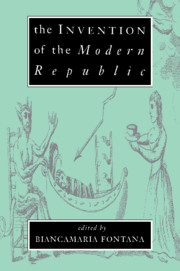Book contents
- Frontmatter
- Contents
- List of Contributors
- Acknowledgements
- Introduction: the invention of the modern republic
- 1 Ancient and modern republicanism: ‘mixed constitution’ and ‘ephors’
- 2 Checks, balances and boundaries: the separation of powers in the constitutional debate of 1787
- 3 From Utopia to republicanism: the case of Diderot
- 4 Cordeliers and Girondins: the prehistory of the republic?
- 5 The constitutional republicanism of Emmanuel Sieyès
- 6 The Thermidorian republic and its principles
- 7 Francesco Mario Pagano's ‘Republic of Virtue’: Naples 1799
- 8 Kant, the French revolution and the definition of the republic
- 9 French historians and the reconstruction of the republican tradition, 1800–1848
- 10 The republic of universal suffrage
- 11 The identity of the bourgeois liberal republic
- Bibliography
- Index
3 - From Utopia to republicanism: the case of Diderot
Published online by Cambridge University Press: 05 February 2010
- Frontmatter
- Contents
- List of Contributors
- Acknowledgements
- Introduction: the invention of the modern republic
- 1 Ancient and modern republicanism: ‘mixed constitution’ and ‘ephors’
- 2 Checks, balances and boundaries: the separation of powers in the constitutional debate of 1787
- 3 From Utopia to republicanism: the case of Diderot
- 4 Cordeliers and Girondins: the prehistory of the republic?
- 5 The constitutional republicanism of Emmanuel Sieyès
- 6 The Thermidorian republic and its principles
- 7 Francesco Mario Pagano's ‘Republic of Virtue’: Naples 1799
- 8 Kant, the French revolution and the definition of the republic
- 9 French historians and the reconstruction of the republican tradition, 1800–1848
- 10 The republic of universal suffrage
- 11 The identity of the bourgeois liberal republic
- Bibliography
- Index
Summary
‘On retrouve partout la base et les details de son Contrat social’: in 1782 Diderot seemed to subscribe to this judgement, which offers an interesting indication of the spread of republican ideas in the middle of the eighteenth century, but denies Rousseau's masterwork any greatness. Of course, Diderot's view reflects the lively conflict between the two frères ennemis – a conflict that was still stirring Diderot's mind. Already in 1774, Diderot regarded the republican tradition as not very useful, because it was inescapably linked to small societies: these, in the age of great national states, could have only a precarious existence. It seems therefore that we are at the end of the longue durée of the republican theme, so well illustrated by Quentin Skinner. Mine, therefore, is a research about a silence. But in the history of French political thought this silence has perhaps been of no less importance than the inflamed discourse of Rousseau. This silence nurtured inside it the word of truth: ‘il faut qu'elle reste, cette vérité, ou que tout périsse avec elle’. This is the truth of the ideal political society, where happiness, liberty, and virtue reign: it is the truth of the republic. ‘Les vérités enterrées dans les ouvrages des Gordon, des Sydney, des Machiavel, elles en sortent de tous côtés.’ Consequently, it was no longer enough just to meditate upon this truth; it was necessary to think of it within history, even if it was just this difficulty which had wrecked the earlier theories, in particular that of Rousseau.
- Type
- Chapter
- Information
- The Invention of the Modern Republic , pp. 63 - 85Publisher: Cambridge University PressPrint publication year: 1994

